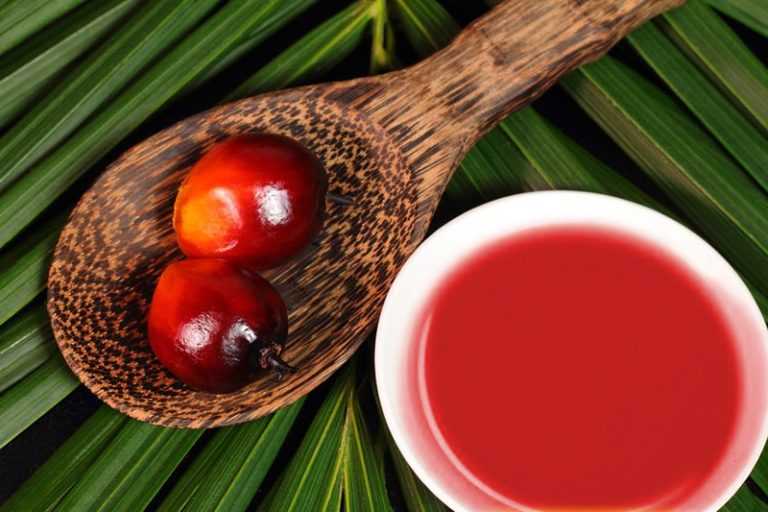Palm oil has witnessed a demand surge in recent times. However, with this increased demand comes the darker side of the story – the rise of adulteration. The act of adulterating palm oil(fake palm oil) involves the addition of foreign substances, compromising its quality and purity.
In Nigeria, where the demand for palm oil surpasses its consistent supply, adulteration has become a very common issue, with the deceptive use of azo dyes such as Sudan III and IV. This article explores five simple ways to identify fake palm oil, shedding light on the menace of adulteration and its consequences.
Join our WhatsApp Channel5 Simple Ways To Identify Fake Palm Oil

Azo Dyes Detection
Azo dyes, particularly Sudan III and IV, are commonly used to enhance the colour of palm oil, giving it a deeper, more vibrant hue. However, these dyes pose serious health risks, including potential carcinogenic effects. To identify fake palm oil tainted with azo dyes, consumers can perform a simple test at home.
Pour a small amount of the palm oil into a transparent glass and add a few drops of iodine. If the oil turns blue or purple, it indicates the presence of azo dyes. A simpler way of knowing if your palm oil has been adulterated with Azo dye, is the colour.
Sedimentation Test
Genuine palm oil usually maintains a clear and consistent texture. Adulterated palm oil, on the other hand, may exhibit sedimentation over time. Allow a sample of palm oil to sit undisturbed for a few hours. If you notice any particles settling at the bottom, it is likely that the palm oil has been adulterated with impurities.
Colour Discrepancies
Authentic palm oil typically has a rich, reddish-orange colour. Adulterated oil, however, might showcase variations in colour, often appearing unnaturally bright or dark. Consumers should be cautious if the palm oil deviates significantly from the expected colour, as it could indicate the presence of artificial dyes.
Taste and Odour Evaluation
The taste and odour of palm oil are distinctive and contribute significantly to its culinary appeal. Fake palm oil may have an altered taste, often described as unnatural or unpleasant. Additionally, genuine palm oil has a characteristic nutty aroma, while adulterated oil would have an off-putting smell. For Nigerian, an original palm oil taste like Banga(Palm Kenel).
Staining Test
Another simple yet effective method to identify fake palm oil is the staining test. Genuine palm oil has a natural ability to stain paper due to its high beta-carotene content. Place a small amount of palm oil on a white piece of paper and observe for any staining. If the oil fails to leave a distinct red or orange stain, it could be an indication of adulteration.
You can also carry out a simpler staining test by pouring the oil into your hand and washing it off. After washing it off, the original palm oil would should leave your hand with an reddish-orange colour residue.
READ ALSO:5 Sexual Benefits Of Bitter Leaf
Health Consequences of Adulterated(Fake) Palm Oil
Adulteration poses significant risks to crude palm oil, leading to the deterioration of its quality, loss of nutritive properties, and a decline in overall organoleptic attributes.
The health implications of adulterated palm oil are severe and far-reaching. Diseases such as cancer, paralysis, allergies, liver damage, cardiac arrest, and epidemic dropsy can be linked to the consumption of adulterated oil. Additionally, life-threatening conditions such as an increase in serum cholesterol become prevalent, posing serious risks to individuals.
Unscrupulous sellers engage in the reprehensible act of mixing palm oil with chemicals and water solely for their selfish interests. This deceptive practice aims to increase the quantity of oil, boosting sales, and involves the addition of harmful substances like Sudan III and IV Azo dyes. These chemicals are incorporated to enhance the color of the palm oil, making it more visually appealing to consumers.
Frequently Asked Questions
Why is the identification of fake palm oil important?
Identifying fake palm oil is crucial for several reasons. Firstly, fake palm oil, especially when adulterated with substances like azo dyes, can pose serious health risks such as cancer and organ damage.
Secondly, consumers deserve to get the quality product they pay for, and distinguishing genuine palm oil from fake ensures they are making safe and informed choices.
Additionally, supporting authentic palm oil discourages unethical practices in the industry, promoting a healthier market for both consumers and producers.
What are the health risks associated with consuming palm oil adulterated with azo dyes?
Yes, there are significant health risks associated with consuming palm oil adulterated with azo dyes, particularly Sudan III and IV.
These dyes are known to be carcinogenic and can lead to serious conditions such as cancer, kidney failure, and liver damage when consistently consumed over time. It underscores the importance of being vigilant in identifying and avoiding fake palm oil to protect one’s health.
How do artificial dyes like Sudan III and IV affect the taste and colour of fake palm oil?
Artificial dyes like Sudan III and IV are often added to fake palm oil to enhance its colour and make it more visually appealing. However, this can result in noticeable changes in both taste and colour.
Fake palm oil may exhibit variations in colour, appearing unnaturally bright or dark. Additionally, the taste may be altered and described as unnatural or unpleasant. Consumers should be wary of such deviations from the expected characteristics, as they can be indicators of palm oil adulteration.
Somto is an Entertainment Reporter with a passion for uncovering the latest stories in the world of entertainment. As a dedicated journalist, Somto delivers in-depth reporting, exclusive interviews, and breaking news coverage.
She covers a wide range of topics, from celebrity interviews to industry trends and film reviews.
As an Entertainment Reporter for Prime Business Africa, She continues to provide comprehensive and insightful coverage of the entertainment industry, offering readers an insider's perspective on the latest developments and trends. She is a trusted source for breaking news, exclusive interviews, and thought-provoking analyses.
Somto is dedicated to providing valuable information and entertainment to her audience while upholding the highest standards of journalistic integrity.
Follow Somto on social media:
LinkedIn: Somtochukwu Bisina
#EntertainmentReporter #MediaProfessional #Journalism


















Follow Us